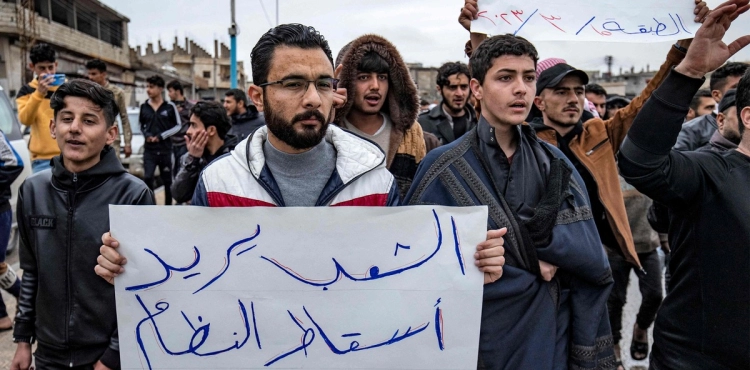A few thousand Syrians demonstrated on Wednesday in the city of Idlib in the northwest of the country, on the 12th anniversary of the start of peaceful protests calling for the overthrow of the regime before it turned into a bloody conflict, stressing their rejection of any normalization" with Damascus.
While President Bashar al-Assad is holding official talks in Moscow on Wednesday, and his regime is benefiting from broad Arab solidarity that followed a devastating earthquake that struck the country and neighboring Turkey last month, the conflict is entering its thirteenth year, burdened with a death toll of more than half a million and tens of thousands missing and displaced amidst enormous humanitarian needs.
In the city of Idlib, one of the main cities still outside the control of the government forces, hundreds of Syrians, young and old, flocked successfully to a main square, carrying the flags of the Syrian opposition. Two banners were raised on the facade of a building overlooking the demonstration square. The first in Arabic read, "The people want the fall of the regime," while the second read in English, "Freedom and dignity for all Syrians."
"We came to commemorate the anniversary of the revolution, this great memory in the heart of every free Syrian," a protester who introduced himself as Abu Shaheed (27 years old) told AFP, adding, "We are proud of this day when we were able to break the barrier of fear and come out in the face of the criminal regime.
Starting in mid-March 2011, tens of thousands of Syrians took part in demonstrations inspired by the "Arab Spring revolutions" calling for the overthrow of the Assad regime, but it quickly turned into a bloody conflict whose parties and supporters varied. Syria has become an arena for Russian, American, Turkish and Iranian fighters.
The commemoration of the uprising this year comes more than a month after a devastating earthquake hit Syria, killing about six thousand people across the country, deepening the suffering of the population, after years of war that caused the destruction of infrastructure and the drain of the economy.
The earthquake exacerbated the population´s living and economic conditions, which placed an additional burden on the international humanitarian organizations that were responding to the Syrian crisis and were already suffering from a lack of funding.
"Unless we get additional funding, we will have to cut (aid) off 3.8 million people out of a total of eight million by July," Corinne Fleischer, the World Food Program´s regional director for the Middle East and North Africa, told reporters in Dubai. .
She said that food needs are at their highest levels since the outbreak of the conflict, with 12.9 million people currently suffering from food insecurity, pointing out that the program needs $700 million until the end of the year.
The United Nations Children´s Fund (UNICEF) warned Wednesday that 12 years of conflict and recent deadly earthquakes have left millions of children at increased risk of malnutrition. She said she needed $172.7 million for immediate life-saving assistance for the 5.4 million people affected by the earthquake, nearly half of them children.
After the earthquake, Assad received a stream of solidarity calls from Arab leaders, kings and presidents, and he received UN envoys. Dozens of aid planes landed, the largest number of which came from the UAE, which is leading regional relief efforts.
Analysts believe that Assad may find in the broad solidarity with him an "opportunity" to accelerate the normalization of his relations with his regional environment, a goal that his supporter of Moscow has been working to achieve for years.
The day after his arrival in Moscow, Al-Assad met his Russian counterpart, Vladimir Putin, on Wednesday, and Russia, with its direct military intervention since 2015, played the most prominent role in tipping the scales in favor of the regime forces, after It lost large areas during the first years of the war.
Efforts to re-float the Assad regime and normalize relations with it anger its opponents.
On the sidelines of her participation in the demonstration, the displaced woman from Damascus, Salma Seif (38 years old), confirmed to France Press, “If all the countries of the world normalize with the regime, we will continue and the revolution will continue. "
A few meters away from her, Ali Haj Suleiman, 24 years old, said, “I am against settlement with a criminal regime,” asking, “How can I bargain with the one who was the reason for my sitting on a chair? .
Syrians commemorate the 12th anniversary of their uprising against the regime












